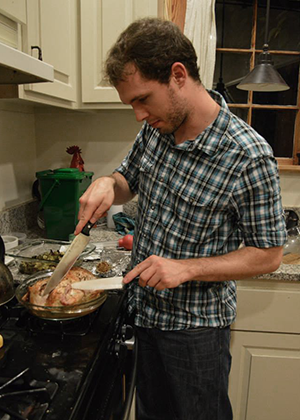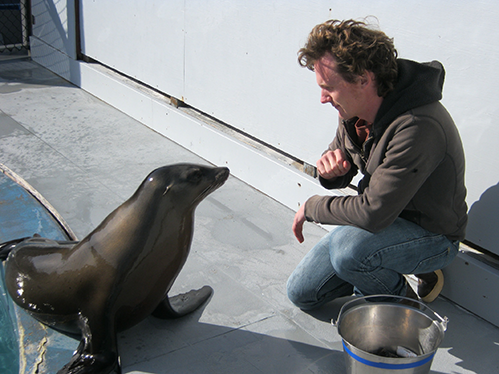Alumni: Post Doctorial Fellows
Andrew Brooks, PhD

Andrew joined the Center for Neuropolicy as a graduate student in neuroscience in June 2009. He earned his PhD in neuroscience from Emory University in 2012, his B.S. in psychology from Mercer University, and is interested in the neurobiological underpinnings of human behavior. In particular, he is working on projects that utilize fMRI to figure out why people behave the way they do during intertemporal choice and decision under risk.
Publications
Brooks, A. M., Capra, C. M., & Berns, G. S. (2011). Neural insensitivity to upticks in value is associated with the disposition effect. Neuroimage. doi:10.1016/j.neuroimage.2011.10.081.
Brooks, A. M., Pammi, V.S.C., Noussair, C., Capra, C. M., Engelmann, J. B., & Berns, G.S. (2010). From bad to worse: Striatal coding of the relative value of painful decisions. Frontiers in Decision Making. doi:10.3389/fnins.2010.00176.
Engelmann, J. B., & Brooks, A. M. (2009) Behavioral and neural effects of delays during intertemporal choice are independent of probability. J. Neuroscience. 29:6055-6057, 2009.
Hyer, H. A., Walid, S. M., Brooks, A. M., Darmohray, D. M., & Robinson, J. S. (2009) Interaction of age and opiod dependence on length of hospital stay for spine surgery patients. Psychological Reports. 105:361-364.
Media
Time - October 12, 2012
What is Your Dog Thinking
WIRED SCIENCE - May 4, 2012
Brain Scans Give Glimpse of How Your Dog Thinks
LiveScience - May 4, 2012
Brain Scans Show Dogs Do Pay Attention to Owners
ScienceDaily - May 4, 2012
What Is Your Dog Thinking? Brain Scans Unleash Canine Secrets
ENN - May 4, 2012
Do You Know What Your Dog Thinks?
PHYS.ORG - May 4, 2012
What is your dog thinking? Brain scans unleash canine secrets in Emory study
Science Blog - May 4, 2012
What is your dog thinking? Brain scans unleash canine secrets
Science Codex - May 4, 2012
What is your dog thinking? Brain scans unleash canine secrets in Emory study
Why We Can't Let Go of Our Losers
The Wall Street Journal
Peter Cook, PhD

(Pictured here with California sea lion "Ronan", a member of UCSC's Pinniped Cognition and Sensory Systems Laboratory, NMFS 932-1905/MA-009526)
Peter Cook received his PhD in Cognitive Psychology from the University of California Santa Cruz in 2013, under the dual advisorship of Margaret Wilson and Colleen Reichmuth. He is also an alum of Columbia University (where he worked in Herb Terrace's primate lab and Diana Reiss's walrus lab while studying for a post-bacallaureate in Psychology) and Pomona College (where he obtained a BA in Philosophy and was lucky enough to study writing with the late, great David Foster Wallace).
Peter's doctoral work was funded by a National Science Foundation graduate research fellowship and the Packard Foundation, and featured a mix of behavioral and structural brain imaging work in over 100 rehabilitating, wild California sea lions with naturally occurring hippocampal lesions as a result of toxic algal exposure. He also taught a sea lion to bob her head to music (representing the first empirical evidence of beat keeping in a non-human mammal).
Peter specializes in memory systems (with a growing interest in the comparative connectome), but is more broadly interested in alternative, humane approaches to comparative neuroscience research. He joined Gregory Berns at The Center for Neuropolicy in Fall 2013 as a Post-Doctoral Fellow to contribute to studies utilizing fMRI with unrestrained dogs. More detail on his projects, past and present, are available on his personal website: www.pfcook.com.
Publications
2013
2011
Cook, P. & Wilson, M. Do young chimpanzees have extraordinary working memory?
Cook, P. & Wilson, M. In practice, chimp working memory study flawed
2010
Cook, P., Bernard, A., & Reichmuth, C. Which way did I go? Remote training of a spatial memory task
Van Bonn, W., et al. First evidence of gas bubble disease in a live marine mammal
Works in Progress
Cook, P., Reichmuth, C., Dennison, S., & Gulland, F. Sea lions with naturally occurring brain lesions from exposure to domoic acid: Behavioral diagnostics and an alternative model to study the cognitive effects of hippocampal damage
Wilson, M. & Cook, P. Sea lions can keep the beat: So why do only humans dance?
Media
CNN - April 2, 2013
Sea lion dances to 'Boogie Wonderland'
Slate - April 2, 2013
Sea Lion Dances Her Heart Out For Science
San Francisco Chronicle - April 3, 2013
Sea lion with rhythm and taste for disco
NBC - April 1, 2013
Sea lion grooves to a disco beat
Interview on sea lions and my research with journalist and illustrator Liz Cunningham
Podcast on sea lion maze work - (with Sascha Zubryd, UC Santa Cruz Science Communication Program)
W. Gavin Ekins, PhD

- Experimental and Neuroeconomics
- Law and Economics
- Public Finance, Tax Policy, and Public Choice
- Methodology Integration
Submitted Papers:
"Why the Percentage Laws are Popular: an Experimental Study of the Percentage Laws, Taxation, and Charitable Giving" with Kevin McCabe (Submitted to JPET)
"You Can't Gamble on Others: Dissociable Systems for Strategic Uncertainty and Risk in the Brain" with Ricardo Caceda, C. Monica Capra, and Gregory Berns (Invited Paper to Special Issue of JEBO)
Working Papers:
"The Neurobiology of Failure: An Experimental Study of Bonus and Penalty Contracts" with Gregory Berns
"The Effect of the Taxation of Risky Income on Investment Behavior " with Terrence Chorvat
"The Neural Correlates of Other-Influencing Behavior" with Kevin McCabe
"The Role of Capital Gain Taxes in the Housing Bubble"
Dissertation
The Percentage Law and the Mediation of Political Conflict
